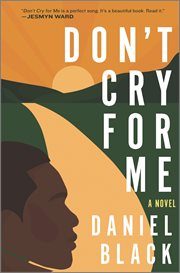Review by Publisher's Weekly Review
Black (The Sacred Place) chronicles a father's confession of his failures in this heartbreaking narrative. Jacob Swinton writes to his estranged gay son, Isaac, in an effort to, in Jacob's words, provide a "record of a poor Black father's appeal... what any dying daddy might say to his son." Jacob recounts his years growing up in Arkansas, where he bullied a queer classmate, and describes his courtship with his wife, Rachel, and their move to Kansas City, where they had Isaac. He also offers insight on Black history and the power of reading, and writes eloquently about the country versus the city, but the core is about how Jacob treats Isaac--having asked him, for instance, "Do you wanna be a sissy, boy?" at the breakfast table after deriding his son for resisting sports, kissing a doll, and performing in a school play. Jacob's shame is made palpable in his alternately hurtful and supportive correspondence ("I wonder how to fix you"; "You weren't the son I wanted"; "Be the kind of man you are, but be a man"), and the wisdom he gains along the way brings him to concluding remarks that are poignant and moving. The painful narrative of regret can feel preachy at times, but it is consistently powerful. Agent: Jim McCarthy, Dystel, Goderich & Bourret. (Feb.)
(c) Copyright PWxyz, LLC. All rights reserved
Review by Library Journal Review
In his introduction to this epistolary novel, Black (They Tell Me of a Home) says, "More than anything, I want readers to reconsider the capacity of our fathers' hearts," and it is precisely such heartfelt reconsideration that he delivers. On his deathbed, 62-year-old Black father Jacob is writing a letter to his gay son, Isaac, whom he hasn't seen in years. Jacob acknowledges the damage he did in not accepting Isaac and seeks to clarify how a tough pre-1960s Arkansas upbringing shaped his understanding of what was expected of him as a man and what he should expect of the world. It's hard work for a man scraping by to support a family, and Jacob's grandaddy thought that showing his family hardness was the right thing to do, just as Jacob thought that tearing apart the action figure Isaac kissed on Christmas morning was the right thing to do. But the world has changed, and as he expresses both love and sorrow Jacob is finally catching up. What results is the story of a complex father-son relationship and a man transformed, even at this late moment. VERDICT A deeply perceptive evocation of what it has meant to be a man and especially a Black man in the United States, all the more affecting for not being shouted out but told with quiet, sturdy intimacy.--Barbara Hoffert, Library Journal
(c) Copyright Library Journals LLC, a wholly owned subsidiary of Media Source, Inc. No redistribution permitted.


